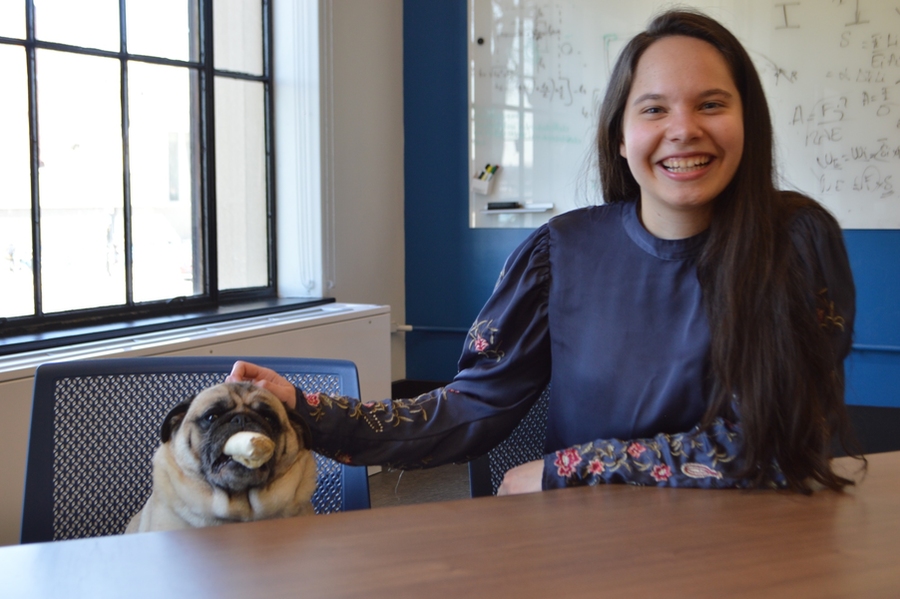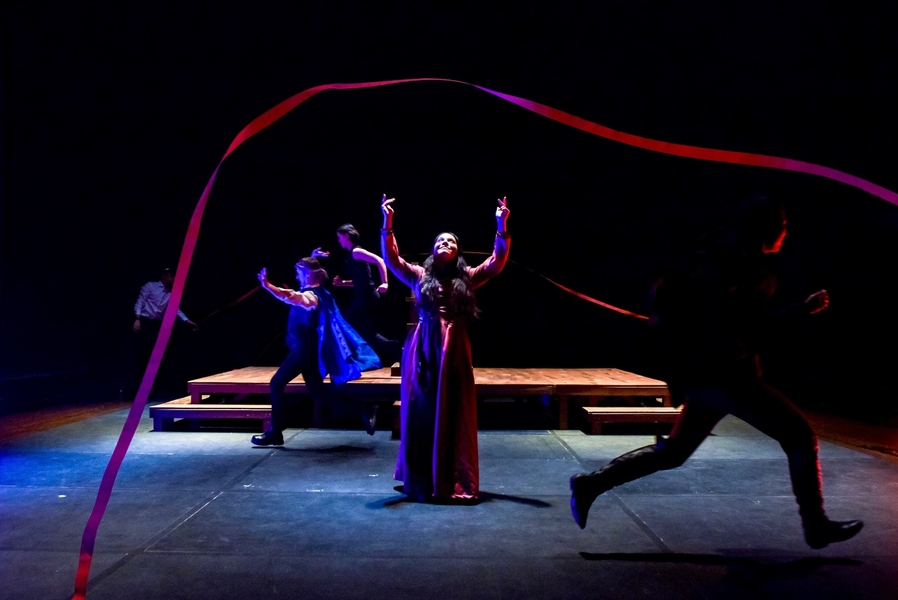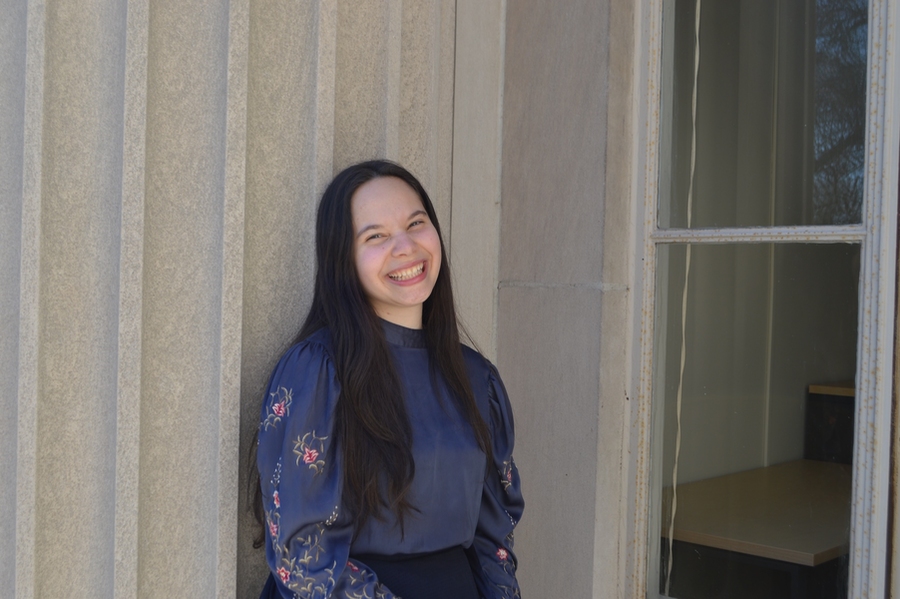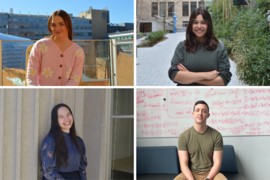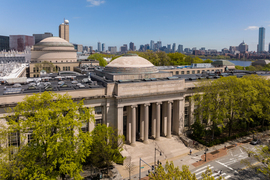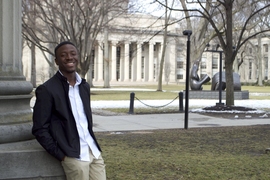Long before she stepped into a lab, Ananda Santos Figueiredo was stargazing in Brazil, captivated by the cosmos and feeding her curiosity of science through pop culture, books, and the internet. She was drawn to astrophysics for its blend of visual wonder and mathematics.
Even as a child, Santos sensed her aspirations reaching beyond the boundaries of her hometown. “I’ve always been drawn to STEM,” she says. “I had this persistent feeling that I was meant to go somewhere else to learn more, explore, and do more.”
Her parents saw their daughter’s ambitions as an opportunity to create a better future. The summer before her sophomore year of high school, her family moved from Brazil to Florida. She recalls that moment as “a big leap of faith in something bigger and we had no idea how it would turn out.” She was certain of one thing: She wanted an education that was both technically rigorous and deeply expansive, one that would allow her to pursue all her passions.
At MIT, she found exactly what she was seeking in a community and curriculum that matched her curiosity and ambition. “I’ve always associated MIT with something new and exciting that was grasping towards the very best we can achieve as humans,” Santos says, emphasizing the use of technology and science to significantly impact society. “It’s a place where people aren’t afraid to dream big and work hard to make it a reality.”
As a first-generation college student, she carried the weight of financial stress and the uncertainty that comes with being the first in her family to navigate college in the U.S. But she found a sense of belonging in the MIT community. “Being a first-generation student helped me grow,” she says. “It inspired me to seek out opportunities and help support others too.”
She channeled that energy into student government roles for the undergraduate residence halls. Through Dormitory Council (DormCon) and her dormitory, Simmons Hall, her voice could help shape life on campus. She began serving as reservations chair for her dormitory but ended up becoming president of the dormitory before being elected dining chair and vice president for DormCon. She’s worked to improve dining hall operations and has planned major community events like Simmons Hall’s 20th anniversary and DormCon’s inaugural Field Day.
Now, a senior about to earn her bachelor’s degree, Santos says MIT’s motto, “mens et manus” — “mind and hand” — has deeply resonated with her from the start. “Learning here goes far beyond the classroom,” she says. “I’ve been surrounded by people who are passionate and purposeful. That energy is infectious. It’s changed how I see myself and what I believe is possible.”
Charting her own course
Initially a physics major, Santos’ academic path took a turn after a transformative internship with the World Bank’s data science lab between her sophomore and junior years. There, she used her coding skills to study the impacts of heat waves in the Philippines. The experience opened her eyes to the role technology and data can play in improving lives and broadened her view of what a STEM career could look like.
“I realized I didn’t want to just study the universe — I wanted to change it,” she says. “I wanted to join systems thinking with my interest in the humanities, to build a better world for people and communities."
When MIT launched a new major in climate system science and engineering (Course 1-12) in 2023, Santos was the first student to declare it. The interdisciplinary structure of the program, blending climate science, engineering, energy systems, and policy, gave her a framework to connect her technical skills to real-world sustainability challenges.
She tailored her coursework to align with her passions and career goals, applying her physics background (now her minor) to understand problems in climate, energy, and sustainable systems. “One of the most powerful things about the major is the breadth,” she says. “Even classes that aren’t my primary focus have expanded how I think.”
Hands-on fieldwork has been a cornerstone of her learning. During MIT’s Independent Activities Period (IAP), she studied climate impacts in Hawai’i in the IAP Course 1.091 (Traveling Research Environmental Experiences, or TREX). This year, she studied the design of sustainable polymer systems in Course 1.096/10.496 (Design of Sustainable Polymer Systems) under MISTI’s Global Classroom program. The IAP class brought her to the middle of the Amazon Rainforest to see what the future of plastic production could look like with products from the Amazon. “That experience was incredibly eye opening,” she explains. “It helped me build a bridge between my own background and the kind of problems that I want to solve in the future.”
Santos also found enjoyment beyond labs and lectures. A member of the MIT Shakespeare Ensemble since her first year, she took to the stage in her final spring production of “Henry V,” performing as both the Chorus and Kate. “The ensemble’s collaborative spirit and the way it brings centuries-old texts to life has been transformative,” she adds.
Her passion for the arts also intersected with her interest in the MIT Lecture Series Committee. She helped host a special screening of the film “Sing Sing,” in collaboration with MIT’s Educational Justice Institute (TEJI). That connection led her to enroll in a TEJI course, illustrating the surprising and meaningful ways that different parts of MIT’s ecosystem overlap. “It’s one of the beautiful things about MIT,” she says. “You stumble into experiences that deeply change you.”
Throughout her time at MIT, the community of passionate, sustainability-focused individuals has been a major source of inspiration. She’s been actively involved with the MIT Office of Sustainability’s decarbonization initiatives and participated in the Climate and Sustainability Scholars Program.
Santos acknowledges that working in sustainability can sometimes feel overwhelming. “Tackling the challenges of sustainability can be discouraging,” she says. “The urgency to create meaningful change in a short period of time can be intimidating. But being surrounded by people who are actively working on it is so much better than not working on it at all."
Looking ahead, she plans to pursue graduate studies in technology and policy, with aspirations to shape sustainable development, whether through academia, international organizations, or diplomacy.
“The most fulfilling moments I’ve had at MIT are when I’m working on hard problems while also reflecting on who I want to be, what kind of future I want to help create, and how we can be better and kinder to each other,” she says. “That’s what excites me — solving real problems that matter.”
